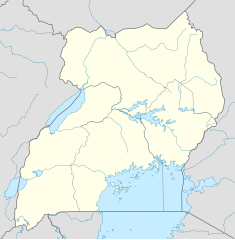Ayago Hydroelectric Power Station, also Ayago Power Station, is a planned 840 megawatt hydroelectric power project to be constructed in Uganda.[1] If it is built, Ayago would be the largest power station in Uganda, based on generating capacity.[2]
| Ayago Hydroelectric Power Station | |
|---|---|
| Country | Uganda |
| Location | Ayago, Nwoya District |
| Coordinates | 02°17′02″N 32°01′21″E / 2.28389°N 32.02250°E |
| Purpose | Power |
| Status | Proposed |
| Dam and spillways | |
| Impounds | Victoria Nile |
| Ayago Power Station | |
| Commission date | 2030 (Expected) |
| Installed capacity | 840 megawatts (1,130,000 hp) |
Location
editThe power station will be located at Ayago, on the Victoria Nile, in Nwoya District, in the Acholi sub-region, in the Northern Region of Uganda. This location is close to the point where the Ayago River enters the Victoria Nile, within the confines of Murchison Falls National Park.[3]
Overview
editAyago Power Station is a proposed 840-megawatt (1,130,000 hp) hydroelectric plant that will be constructed on the Victoria Nile, downstream of Karuma Power Station, but upstream of Murchison Falls. The project will be developed in two simultaneous phases, known as Ayago North (estimated capacity:450 MW) and Ayago South (estimated capacity:390 MW).[4] The Ayago Power Station is one of three hydropower projects that have been earmarked for immediate development, together with Karuma Power Station (600 MW) and Isimba Power Station (183 MW), to mitigate the chronic, recalcitrant power shortages that have plagued Uganda since the 1990s, and to meet the projected national requirement of 1,130 MW by 2023.[5]
Construction costs
editThe Indian state-owned energy and manufacturing company, BHEL, had estimated the cost of the project at about US$350 million in 2007. But that was for a project with planned capacity of 200 MW to 300 MW, back in 2007.[6]
In 2008, the Government of Japan, through the Japan International Cooperation Agency (JICA), in collaboration with the Government of Uganda, began preparations for fresh environmental impact assessments, international bidding for a contractor and commitment as a lead funding source for the project.[7]
In April 2013, the Government of Uganda awarded the US$1.9 billion construction contract to Mapa Construction and Trading Company Incorporated, a Turkish infrastructure construction company.[8] However, in August 2013, that award was rescinded and the construction contract was awarded to China Gezhouba Construction Company.[9] It was anticipated that construction would begin in 2020,[10] and last approximately 66 months.[11]
Recent developments
editBy 2019, the size of Ayago Power Station had been increased from 600 to 840 megawatts. The government of Uganda has publicly indicated that it would like the power station built, but it lacks the financial muscle to do so itself. Both Mapa Construction and Trade Company of Turkey and the Gezhouba Group of China have lost interest in the project, partly due to failure to raise the necessary capital.[12]
In February 2020, Power Construction Corporation of China (PowerChina), a Chinese government-owned engineering and construction conglomerate made formal application to the Electricity Regulatory Authority (ERA), to design, fund, build, operate and maintain Ayago Power Station. ERA's response to that application has not been made public as of September 2020.[13][14]
The cost of constructing Ayago has also increased to over US$2 billion, on account of the increase in wattage capacity, from the original 600 MW to the current 840 MW.[2]
See also
editReferences
edit- ^ Epajjar Ojulu (10 March 2017). "Uganda: East Africa's hydro powerhouse". African Business. London: African Business Magazine. Retrieved 24 December 2017.
- ^ a b Alon Mwesigwa (31 January 2020). "Chinese Firm Applies For Construction of 840MW Ayago Dam". Uganda Radio Network. Kampala. Retrieved 5 April 2022.
- ^ "Location of the Mouth of River Ayago, Where It Pours Into the Victoria Nile" (Map). Google Maps. Retrieved 24 December 2017.
- ^ Harriette Onyalla (21 March 2007). "Government Proposes 14 Dam Sites". Kampala: New Vision Group. Retrieved 17 September 2020.
- ^ Ibrahim Kasita (1 February 2011). "Electricity Demand To Triple By 2023". New Vision. Kampala. Archived from the original on 22 January 2015. Retrieved 18 September 2020.
- ^ John Kakande (31 January 2007). "Indian Firm To Build Power Dam In North". New Vision. Kampala. Archived from the original on 25 December 2017. Retrieved 24 December 2017.
- ^ Ibrahim Kasita (1 January 2008). "Japan To Send Experts For Ayago Power Project". New Vision. Kampala. Archived from the original on 24 December 2017. Retrieved 24 December 2017.
- ^ New Vision (22 April 2013). "Turkish Company To Build Ayago Dam". New Vision. Kampala. Retrieved 7 May 2014.
- ^ Nelson Wesonga (15 August 2013). "Ayago Power Project 'Snatched' From Turks". Daily Monitor. Kampala. Retrieved 7 May 2014.
- ^ Michael Wakabi (17 August 2013). "Karuma power plant paves way for more stations". The EastAfrican. Nairobi. Archived from the original on 24 December 2017. Retrieved 24 December 2017.
- ^ JICA (March 2011). "JICA Open Report: Project for Master Plan Study on Hydropower Development in the Republic of Uganda" (PDF). Tokyo: Japan International Cooperation Agency (JICA). Retrieved 24 December 2017.
- ^ Dominic Ochola and Emmy Daniel Ojara (31 May 2019). "Construction of Ayago Hydro Power Still Hangs in Balance". Kampala: Uganda Radio Network. Retrieved 18 September 2020.
- ^ Elias Biryabarema and David Evans (11 February 2020). "Uganda says Chinese firm applies to build $1.4 bln power plant on the Nile". Reuters.com. Retrieved 5 April 2022.
- ^ Ilaria Grasso Macola (13 February 2020). "PowerChina seeks licence for Ugandan $1.4bn hydropower plant". Power-Technology.com. New York City. Retrieved 22 July 2022.
